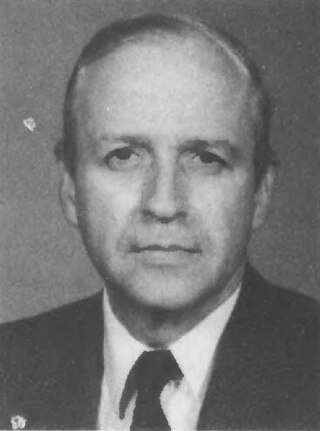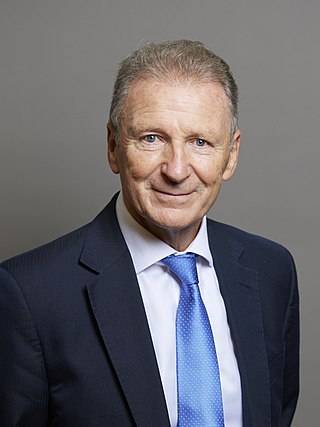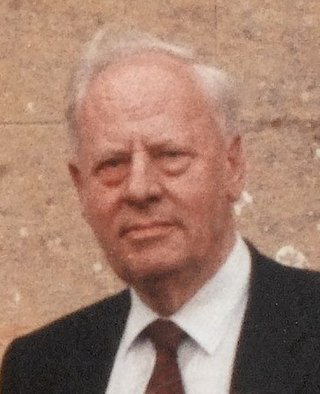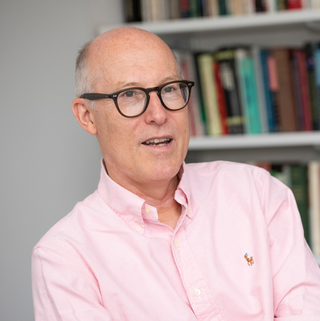
Sir John Ashworth (born 27 November 1938) [1] is a British scientist and educationalist.

Sir John Ashworth (born 27 November 1938) [1] is a British scientist and educationalist.
Ashworth was educated at West Buckland School and Exeter College, Oxford. [1] He obtained a PhD degree in biochemistry at Leicester University and was a lecturer and reader there before taking up a post of foundation Professor of Biology at University of Essex in 1974. [2] His scientific research at the time focused on developmental biology and cell differentiation, with a particular interest in the slime mold.
Ashworth joined the UK government's Cabinet Office in 1976, where he acted as the chief scientific adviser to the government, initially on secondment, and then as an undersecretary in the Cabinet Office from 1979 to 1981. He became vice-chancellor at the University of Salford from 1981 to 1990, [3] and then director of the London School of Economics from 1990 to 1996. [2]
Ashworth was a chairman of the British Library board 1996–2001, the Institute of Cancer Research (deputy chairman) 2003–07, and Barts and the London NHS Trust 2003–07. [4]
Ashworth is a governor of the Ditchley Foundation and is chairman of the board of trustees at Richmond, The American International University in London, a private liberal arts and professional studies university based in Richmond upon Thames and Kensington. [5]
Sir John was awarded an Honorary Doctor of Laws from the University of Leicester in 2005. He retired in 2007, and was awarded a knighthood for public services in the Queen's New Year Honours list 2008. [4] He was made an Honorary Fellow of Exeter College, Oxford in 1983.

William Henry Beveridge, 1st Baron Beveridge, was a British economist and Liberal politician who was a progressive, social reformer, and eugenicist who played a central role in designing the British welfare state. His 1942 report Social Insurance and Allied Services served as the basis for the welfare state put in place by the Labour government elected in 1945.

Raymond George Hardenbergh Seitz is a former career diplomat and U.S. Ambassador to the United Kingdom. He was born in Honolulu, Hawaii on December 8, 1940. He is the son of United States Army Major General John F. R. Seitz and Helen (Hardenbergh) Seitz.

Augustine Thomas O'Donnell, Baron O'Donnell, is a former British senior civil servant and economist, who between 2005 and 2011 served as the Cabinet Secretary, the highest official in the British Civil Service.

Sir Robert Milton Worcester, is an American-born British pollster who is the founder of MORI and a member and contributor to many voluntary organisations. He is a well-known figure in British public opinion research and political circles and as a media commentator, especially about voting intentions in British and American elections.

Sir Colin Blakemore,, Hon was a British neurobiologist, specialising in vision and the development of the brain. He was Yeung Kin Man Professor of Neuroscience and senior fellow of the Hong Kong Institute for Advanced Study at City University of Hong Kong. He was a distinguished senior fellow in the Institute of Philosophy, School of Advanced Study, University of London and Emeritus Professor of Neuroscience at the University of Oxford and a past Chief Executive of the British Medical Research Council (MRC). He was best known to the public as a communicator of science but also as the target of a long-running animal rights campaign. According to The Observer, he was both "one of the most powerful scientists in the UK" and "a hate figure for the animal rights movement".
Honorary titles in academia may be conferred on persons in recognition of contributions by a non-employee or by an employee beyond regular duties. This practice primarily exists in the UK and Germany, as well as in many of the universities and colleges of the United States, Australia, Hong Kong, Taiwan, China, New Zealand, Japan, Denmark, and Canada.

Michael Meredith Swann, Baron Swann, was a British molecular and cell biologist. He was appointed chairman of the BBC, awarded a knighthood and subsequently a life peerage.

Keith Anderson Hope Murray, Baron Murray of Newhaven, KCB was a British academic and Rector of Lincoln College, Oxford.
Sir Roy Malcolm Anderson is a leading international authority on the epidemiology and control of infectious diseases. He is the author, with Robert May, of the most highly cited book in this field, entitled Infectious Diseases of Humans: Dynamics and Control. His early work was on the population ecology of infectious agents before focusing on the epidemiology and control of human infections. His published research includes studies of the major viral, bacterial and parasitic infections of humans, wildlife and livestock. This has included major studies on HIV, SARS, foot and mouth disease, bovine tuberculosis, bovine spongiform encephalopathy (BSE), influenza A, antibiotic resistant bacteria, the neglected tropical diseases and most recently COVID-19. Anderson is the author of over 650 peer-reviewed scientific articles with an h-index of 125.
Sir Rex Edward Richards was a British scientist and academic. He served as Vice-Chancellor of the University of Oxford and as a director of the Leverhulme Trust.

Sir Timothy John Besley, is a British academic economist who is the School Professor of Economics and Political Science and Sir W. Arthur Lewis Professor of Development Economics at the London School of Economics (LSE).

Margaret Mary Gowing (née Elliott), was an English historian. She was involved with the production of several volumes of the officially sponsored History of the Second World War, but was better known for her books, commissioned by the United Kingdom Atomic Energy Authority, covering the early history of Britain's nuclear weapons programmes: Britain and Atomic Energy 1939–1945, published in 1964, and the two-volume Independence and Deterrence: Britain and Atomic Energy 1945–52, published in 1974.

SharmishtaChakrabarti, Baroness Chakrabarti, is a British politician, barrister, and human rights activist. A member of the Labour Party, she served as the director of Liberty, a major advocacy group which promotes civil liberties and human rights, from 2003 to 2016. From 2016 to 2020, she served as Shadow Attorney General for England and Wales.
Sir Patrick Dalmahoy Nairne, was a senior British civil servant. His career started in the Admiralty. He eventually became Permanent Secretary of the Department of Health and Social Security and Master of St Catherine's College, Oxford (1981–88). Nairne was a member of the Privy Council of the United Kingdom, appointed in 1982 when he became a member of Lord Franks' official inquiry into the Falklands War, and a governor of the Ditchley Foundation. He was Chancellor of the University of Essex from 1982 to 1997. He was an Honorary Fellow of University College, Oxford. Nairne was the first Chair of the Nuffield Council on Bioethics from 1991 to 1996.

Sir Maurice Shock was a British university administrator and educationalist.
The Honours Committee is a committee within the Cabinet Office of the Government of the United Kingdom formed to review nominations for national honours for merit, exceptional achievement or service. Twice yearly the Honours Committee submits formal recommendations for the British monarch's New Years and Birthday Honours. Members of the Honours Committee—which comprises a main committee and nine subcommittees in speciality areas—research and vet nominations for national awards, including knighthoods and the Order of the British Empire.
Sir Harry Work Melville, was a British chemist, academic, and academic administrator, who specialised in polymer research. He spent his early career in academia as a lecturer and researcher, before moving into administration as a civil servant and university college head.

Derek Robin Diamond (1933–2015) was an applied geographer and academic. He was Professor of Geography at the London School of Economics between 1982 and 1995, and was a specialist in urban and regional planning.
Sir John Sparrow, FCA was an English businessman, chartered accountant and government adviser.